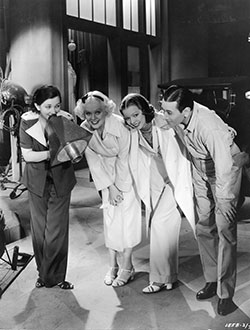The Life of a Song — ‘I’m in the Mood for Love’

Simply sign up to the Life & Arts myFT Digest -- delivered directly to your inbox.
It’s strange that a song called “I’m in the Mood for Love” should prove so un-erotic once recorded. Even more so as it starts with the racy (for its time) line “I’m in the mood for love/ Simply because you’re near me”, and ends by casting caution to the winds with “But, for tonight, forget it/ I’m in the mood for love”.
The song was written in 1935 by Jimmy McHugh and Dorothy Fields for the American romantic comedy Every Night at Eight. The film had to comply with the Motion Picture Production Code (otherwise known as the Hays Code), which required films to “encourage correct standards of life” and uphold “the sanctity of the institution of marriage and the home”.
Thus any hint that Fields’ lyrics might suggest something other than “correct” feelings needed to be cancelled out by McHugh’s music. And so they were: the song’s melody, unembellished, is profoundly unsexy: no funny business is signalled here.
In the film, a shy young woman’s mood for love ended not in seduction but marriage. Frances Langford played the part of a passionate innocent so well that she reprised the song in the 1936 film Palm Springs. In the same year child actor Carl “Alfalfa” Switzer performed it in the Our Gang short The Pinch Singer.
Four versions of the song had entered the Billboard charts the year before, including one by Langford that reached No. 15. Louis Armstrong’s joyfully innocent syncopated trumpet and vocal reading got to No. 3, but it was Little Jack Little’s strict tempo version that reached No. 1.

“I’m in the Mood for Love” became a crooner’s staple. Billy Eckstine had a minor hit in 1945, Cliff Richard used it to prove his own crooning credentials in 1964, as did Rod Stewart more than 40 years later. Over in Sweden, the great American jazz saxophonist James Moody was playing a club engagement in 1949 and recorded the tune in one take under the name of James Moody and his Swedish Crowns. Moody opens the track with a short repeated phrase — he was said to be getting used to both a borrowed alto sax and a harmonic sequence that was new to him. It was a minor jukebox hit in the US.
In 1952 vocalist Eddie Jefferson wrote new lyrics to the precise contours of Moody’s sax solo and called it “Moody’s Mood for Love”. The result was both a hit record and a test case for the niche art of jazz vocalese. The new tune was first recorded by vocalist King Pleasure, who saw Moody and Jefferson perform it live. King Pleasure’s single featured a cameo role for vocalist Blossom Dearie and was a huge hit on its release in 1952 — prompting the original song’s publishers to sue King Pleasure’s label for copyright infringement.

The judgment of that case was a little harsh on Jefferson’s slightly saucy mickey-taking lyrics: the judge described them as “a mélange of words that has no pattern or arrangement”. In fact, Jefferson’s lyrics turn the prurience of Hollywood convention on its head by telling the story of a star-crossed male droning endlessly on before being told to get on with it by the woman of his dreams. “Now baby, please pull yourself together, do it soon,” she sings. But there were enough references to the original song for the case to be upheld, and from then on McHugh got a share of royalties.
The song is now something of a test-piece for jazz vocalists, rather than anything more adventurous. The two exceptions are Quincy Jones’s seductive arrangement on the 1995 album Q’s Jook Joint, and Amy Winehouse’s expressions of desire over reggae-inflected support on her 2003 debut studio album Frank.
For more in this series, as well as podcasts with clips from the songs, visit ft.com/life-of-a-song
Photograph: Hulton Archive/Getty Images
Comments